
After I read all the medical journals and watched all the
After I read all the medical journals and watched all the documentaries, I still didn't understand the physical sensation of ticking and where it comes from and what it feels like.






In the reflective words of Robin Tunney, “After I read all the medical journals and watched all the documentaries, I still didn’t understand the physical sensation of ticking and where it comes from and what it feels like,” we are faced with the mystery of human experience—specifically, the experience of Tourette syndrome or similar neurological conditions. Despite the accumulation of knowledge and data from scientific sources, Tunney points out that understanding the facts alone is insufficient to grasp the lived sensation of such an experience. This speaks to the limits of intellectual understanding, for knowledge can explain the cause of a phenomenon, but it is only through personal experience that one can truly know its impact. The quote reveals the timeless tension between rational knowledge and the intangible realities of the human experience.
The origin of this quote reflects Tunney's own role in portraying a character with Tourette syndrome and the profound realization she had while immersing herself in both scientific literature and documentaries to understand the condition. While the facts helped her portray the condition, she recognized that they were only part of the picture. Knowledge gained from books and external sources could explain what was happening in the body but could not reveal the internal sensations—the rawness of what it feels like to live with an uncontrollable condition. This is the great limitation of external knowledge: it can quantify and describe, but it can never fully embody the lived experience of another person.
The ancients, too, wrestled with the boundaries of understanding and experience. The philosopher Socrates famously said, “The only true wisdom is in knowing you know nothing.” In this statement, Socrates acknowledged that no amount of learning could fully encompass the totality of human existence. The Greek tragedies, such as those written by Sophocles and Euripides, explored the limits of human understanding. Even with reason, intellect, and philosophy, characters in these plays often failed to fully grasp the consequences of their actions, often leading to tragic outcomes. This theme of intellectual limitation is deeply woven into the fabric of ancient wisdom: while reason can explain much, it is still bound by the unquantifiable mysteries of life—the human heart, the soul, and the felt experience.
Consider the story of Hippocrates, often called the father of medicine. Though he revolutionized the understanding of disease and medicine, even he recognized that there were limits to his knowledge. In his famous Hippocratic Oath, he pledges to do no harm, but he also acknowledges that there are unknowns, places where the limits of medical knowledge meet the mysteries of the body. Much like Tunney’s quote, Hippocrates understood that even the best medical practice and the most rigorous understanding of human anatomy could not fully capture the lived experience of a patient. The personal experience of illness, whether physical or mental, remains beyond the reach of pure logic and fact.
Tunney’s statement also reveals an inherent truth about the nature of human suffering: it cannot always be understood through external research or rational thinking alone. In every culture, from the sages of the East to the philosophers of the West, there has always been an understanding that some aspects of the human experience are mysterious, unquantifiable, and ultimately subjective. For example, the Buddhist tradition teaches that suffering is an inherent part of the human condition, and true understanding comes not from intellectual knowledge, but from personal experience and mindfulness. Suffering, whether physical or emotional, has a language that transcends the mind’s ability to comprehend it fully. It is in the body’s sensations and the mind’s reactions that we begin to understand, and even then, it is a lifetime's journey to grasp its depth.
The lesson here is clear and profound: there are limits to intellectual knowledge, and no matter how much we learn, there will always be aspects of the human experience that can only be understood through empathy and lived experience. Scientific knowledge can describe what happens, but it cannot always convey how it feels. Empathy—the ability to understand and share the feelings of others—is the bridge between knowing and truly understanding. In our own lives, we must be mindful of the limits of rational knowledge and always seek to connect with the human experiences that elude reason. Whether in medicine, relationships, or any other field, it is the human element that cannot be reduced to data or numbers, and it is the deepest understanding that comes from living fully in the moment with others.
In conclusion, Tunney’s words call us to acknowledge the boundaries of intellectual comprehension and to embrace the complexity of human life. We must understand that knowledge is essential but not sufficient; it must be paired with empathy and the recognition that the true essence of human experience can never be fully captured in books or studies. In our own endeavors, let us strive to expand our understanding of the world, but let us also honor the mystery of the lived experience, knowing that there are things only the heart and soul can truly understand. Just as the ancients grappled with the unknowable, we too must learn to respect the wisdom found in places that knowledge alone cannot reach.






AAdministratorAdministrator
Welcome, honored guests. Please leave a comment, we will respond soon